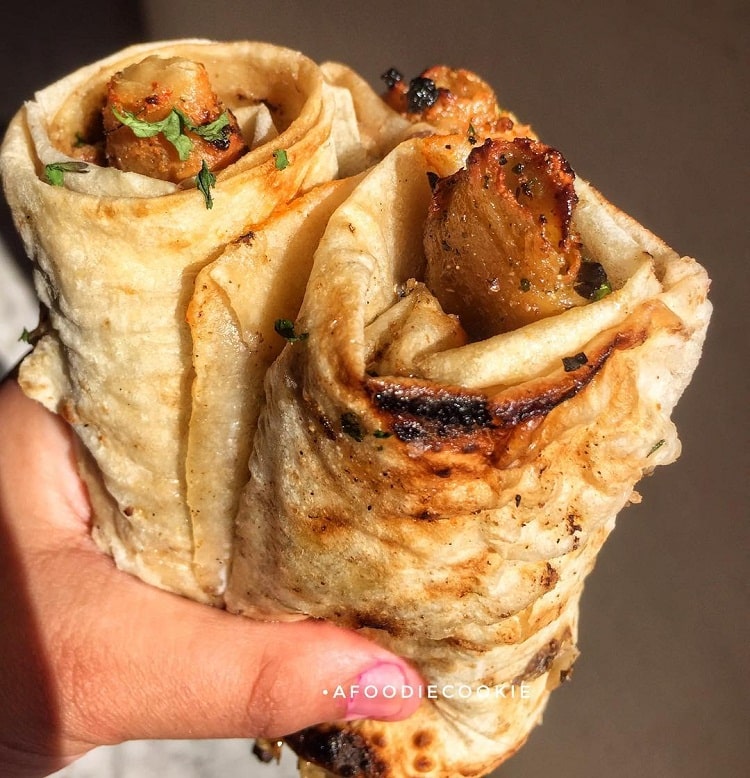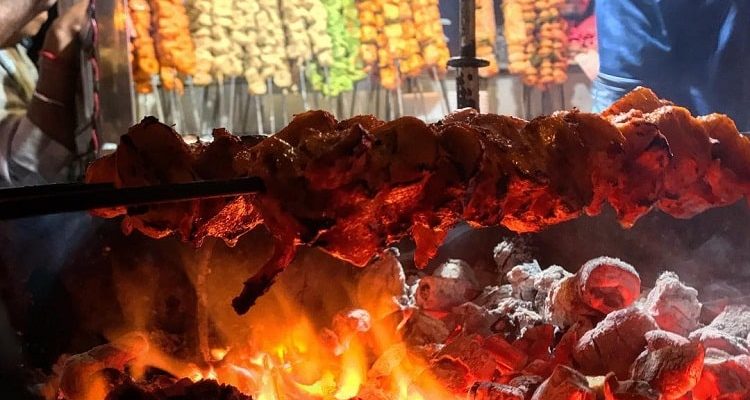Virtually absent from the country’s culinary heritage, Soya Chaap has emerged a ubiquitous treat Indians are hungry for.
◊ By Radhika Rao
Visit ORGANIC SHOP by Pure & Eco India
In India, which has a vegetarian population of approx 500 million, a plant protein revolution has begun. On almost every street corner, on the menu card of every street food vendor, one will find at least a few representations of Soya Chaap—a mock meat derived from soybean.
Virtually absent from the country’s culinary heritage, Soya Chaap has emerged a ubiquitous treat. Long-time vegetarians are drawn to it as a welcome diversion from the overexposed paneer and new converts to vegetarianism appreciate its meat-like taste and texture.

Various flavours of Chaap Tikka hang on skewers; @kumar_harshit/Instagram
Barbecue joints serve up sizzling plates of tandoori chaap, and roll-makers frenetically belt out malai chaap rolls by the minute to appease hungry queues. The delectable chaap appears in many gastronomical avatars—in a spicy chaap curry or manchurian dish, as a succulent tikka, in the form of a crispy drumstick, or as ‘meat’ in a kadai chicken or rogan josh rendition.
Virtually absent from the country’s culinary heritage, it has emerged a ubiquitous treat, which has gained prominence of late. Not only street food purveyors but also restaurants, cafés, fast food outlets and fine dining establishments, all now employ this rather versatile ingredient. Long-time vegetarians are drawn to it as a welcome diversion from the overexposed paneer (cottage cheese) and new converts to vegetarianism appreciate its meat-like taste and texture.

Tandoori Chaap Rolls; @afoodiecookie/Instagram
To cater for the growing demand, several plant-based food product companies including Good Dot, Vezlay and Ahimsa Food have come up with vegetarian meat options. Vegetarian meats are Plant Based Proteins or Alternative Proteins—proteins derived from plants, as opposed to those derived from animals.
Good Dot offers vegetarian meat made of soy, wheat, pea and quinoa. Vezlay produces a large variety of soy-based foods including vegetarian meat burger patties, vegetarian meat chops, vegetarian meat nuggets and mock meat kebabs. Ahimsa Food’s Veggie Champ brand boasts a range of mock meats made of soy and vegetables: tandoori sausages, hot dogs, fillets, salami and even mock duck. It is currently geared to extend its plant-based offerings to the next frontier—mock prawns.

Stuffed Soya Chaap with Cottage Cheese & Pea Filling; @yourfoodcompanion/Instagram
Barbecue joints serve up sizzling plates of tandoori chaap, and roll-makers frenetically belt out malai chaap rolls by the minute to appease hungry queues. The delectable chaap appears in many gastronomical avatars—in a spicy chaap curry or manchurian dish, as a succulent tikka, in the form of a crispy drumstick, or as ‘meat’ in a kadai chicken or rogan josh rendition.
WHY MEAT WON’T CUT IT ANYMORE
The consumption of meat is associated with an increased risk of several long term diseases including diabetes, heart disease, cancer and stroke. The increase in consumption of meat has led to the industrialisation of animal agriculture, resulting in the spread of many zoonotic and pathogenic diseases. Animals raised for meat, dairy and eggs are pumped with antibiotics and hormones. As a result, when consumed they cause antibiotic resistance in humans—an epidemic resulting in more than 700,000 deaths per year, worldwide.
Furthermore, the traditional method of producing animal-based protein is not viable for a number of reasons. The ethical and environmental challenges associated with the production and consumption of meat, dairy, and eggs have long been touted as the biggest threats to the planet, with respect to public health, environmental impact and animal welfare.

Chinese Chilli Chaap; @somethingg_moree/Instagram
Animal agriculture is one of the largest contributors to greenhouse gas emissions and is extremely resource-intensive. For instance, to produce one calorie of chicken meat, 9 calories of input is required, this being the most efficient meat to produce, mind you.
As per findings of the FAO (Food & Agriculture Organization of the United Nations), the livestock sector contributes to 18% of total greenhouse gas emissions, 37% of all human-induced methane emissions, as well as, deforestation, with a staggering 30% of the Earth’s land surface used for permanent pasture.
To provide our growing population with protein that is healthier, and in agreement with the UN’s Sustainable Development Goals, a paradigm shift needs to take place in our food system, away from resource-intensive, inhumane animal agriculture, and towards sustainable, new-age sources of nutrition.
THE WORLD IS MOVING TOWARDS PLANT-BASED PROTEINS
Milk, meat and eggs have been popularly believed to be the most reliable sources of protein, but plant-based sources are just as equipped if not more, with protein content. Whereas chicken, meat, milk and eggs contain 27 gm, 26 gm 3.4 gm and 13 gm of protein per 100 gm respectively, soya contains a robust 36 gm of protein per 100 gm, with pea protein at 26 gm per 100 gm and Mycoprotein (protein derived from fungi) at 11 gm per 100 gm, which is still higher than the protein content of milk. Algae is also a rich source of protein, with 63% protein content.
PROTEIN CONTENT COMPARISON (per 100 gm)
| Plant-Based Protein | Animal-Derived Protein |
| Mycoprotein: 11 gm | Milk: 3.4 gm |
| Pea Protein: 26 gm | Egg: 13 gm |
| Soya: 36 gm | Meat: 26 gm |
| Chicken: 27 gm |
Over the past decade, significant progress has been made towards the advancement of the Alternative Protein sector, in terms of academic research, financial investment, and media engagement. Various new sources of protein are being discovered—Algae and Mycoprotein are a couple. Numerous plants are being studied as potential protein replacements. Extensive research has also demonstrated that these Alt Proteins are significantly more beneficial than animal-derived proteins, in terms of nutritional profile and environmental impact.
Consumers worldwide are gravitating towards the ‘Clean’ label and ethically produced food products. They are witnessing, first hand, the benefits of plant-based eating. Driven by consumer demand, several plant-based food companies, such as JUST, Beyond Meat, Impossible Foods, and Seattle Food Tech have emerged. They are revolutionising our food system and changing the narrative around consumers’ perception of protein.
Recognising the vast potential in alternative proteins, the world’s leading philanthropists, Bill Gates and Richard Branson, and even the largest players in the animal-based meat industry, including Tyson Foods and Cargill, are investing in alternative protein companies. Additionally, established food corporations such as Nestle and Tesco are expanding their portfolios, and including diversification of protein as part of their company goals.
As per the market research firm, Research and Markets’ report, ‘Plant Based Protein Market – Global Opportunity Analysis and Industry Forecast 2017-2022, the global market share of plant-based foods is projected to reach US$10,892 million by 2022, with a CAGR of 6.7%.
Even in Asia, where the influences that define the consumption of meat are starkly different from the West and the movement towards alternative proteins is just beginning to gain momentum, plant-based foods are on the rise. Between 2012 -2016, new vegetarian and vegan product launches increased by 140% and 440% respectively in Southeast Asia alone. The research firm, Persistent Market Research, in its report, Plant-Based Proteins Market: Global Industry Analysis (2012-2016) and Forecast (2017-2025), indicates the Asia-Pacific region will register the highest CAGR within this segment, at 6.3%, between 2017 and 2025.
With demand for plant-derived proteins increasing worldwide, soya chaap and its plant-based cohorts are no longer a peripheral food. They’re very much the mainstream.
NOTE: If you are Vegan or are interested in exploring Veganism, do not miss India’s 1st Vegan trade fair — VEGAN INDIA EXPO — which will take place in New Delhi from 5-7 July, 2019. Block your dates!

The author is Campaign Manager for Institutional Meat Reduction, Humane Society International, India



Soya Chapp is the best food to try out if you want to turn vegetarian 🙂